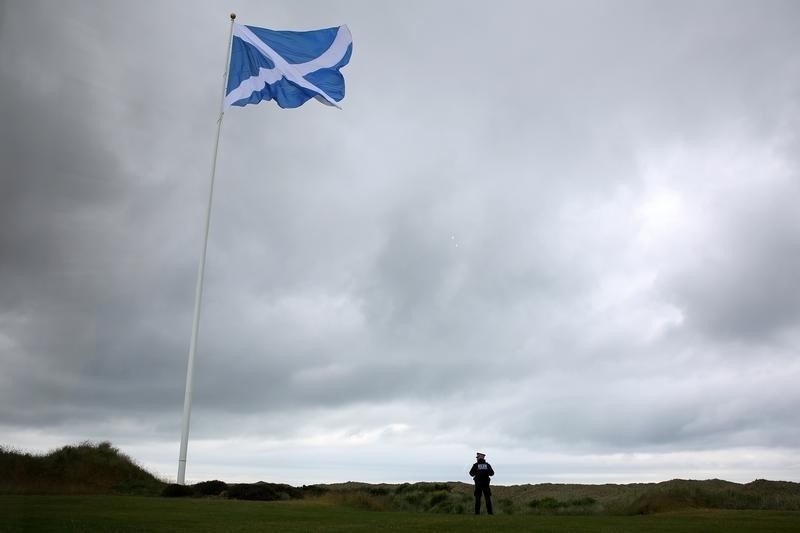EDINBURGH (Reuters) - Scotland's fiscal deficit stood at about a tenth of its economy in the year to March 2016, hammered by a slump in oil and gas revenues and potentially dampening arguments for Scottish independence.
Scotland's share of North Sea oil revenues crashed 97 percent to 60 million pounds in the year to March from 1.8 billion pounds a year ago and 8.2 billion ten years earlier.
Data released by the Scottish government on Wednesday showed lower oil prices -- which reduce government tax revenues -- and higher public spending mean that the country still needs to address how to expand its economy beyond oil, First Minister Nicola Sturgeon said.
She said Britain's decision to leave the European Union in a referendum in June, which was not supported by voters in Scotland, was threatening prospects for the Scottish economy.
The 9.5 percent gap in Scottish public finances as a percentage of its economy is more than twice the size of Britain's overall 4 percent deficit, including North Sea oil, and is up from a gap of 9.1 percent in the previous year.
The data also showed growing onshore revenues offset by increased spending on heath and education -- one of the key tenets of the devolved nationalist government's campaign to offer a contrast to austerity in the rest of Britain.
"Scotland's challenge is to continue to grow our onshore economy. However, Scotland's long-term economic success is now being directly threatened by the likely impact of Brexit,"
Sturgeon said.
Scotland voted against independence in 2014, and one of the reasons behind that is thought to be fears of unhooking its economy from the rest of the UK, where the tax take helps fund Scottish public services.
However Britain's vote to leave the European Union, known as Brexit, has rekindled the cause of independence once again because Scotland as a single nation voted to stick with the EU.
Including a geographical share of North Sea revenue, the net fiscal balance -- the balance of all that is spent and received by public departments -- stood at 14.8 billion pounds ($19.6 billion) in the twelve months to March 2016.
The Scottish government argues that the economic uncertainty caused by Brexit means that it can no longer be said that the UK as a constitutional structure provides stability.
However the UK government's minister for Scotland, David Mundell, noted that Scotland was able to withstand the economic cycle because of the strength of the overall UK economy.
"Scotland weathered a dramatic slump in oil revenues last year because we are part of a United Kingdom that has at its heart a system for pooling and sharing resources across the country as a whole," he said in a statement.
Britain has now to map out the terms of its new trade agreement with the rest of the world following the Brexit vote. It is not expected to formally start the process until the end of the year.
Sturgeon is not ruling out another Scottish independence referendum as part of efforts to keep Scotland in the EU.
The Scottish Greens said the figures would be seized on to back arguments for and against independence but the data really showed the economy needed to reduce its dependence on oil.
"In truth, the figures show what has been clear for years - that a strong future for Scotland's economy will depend on ending our reliance on oil and gas, and investing in the industries of the 21st century instead," said party leader Patrick Harvey.
